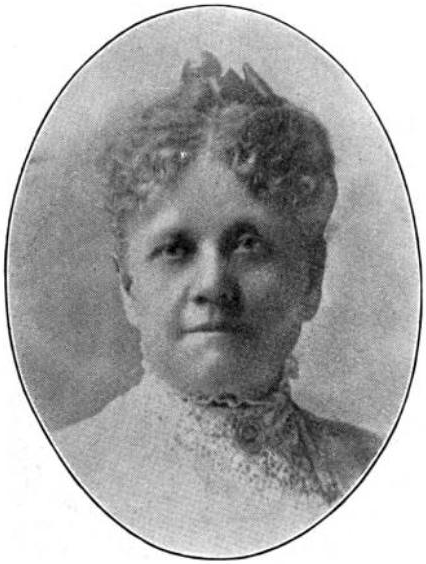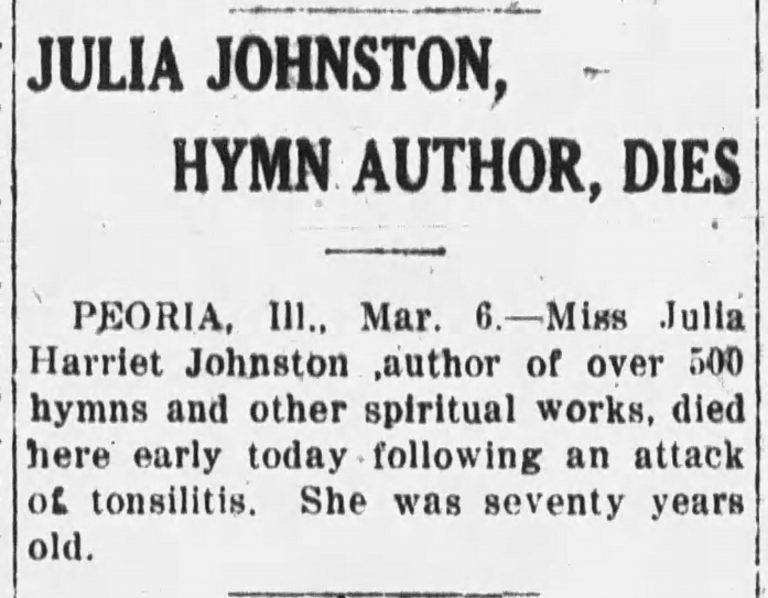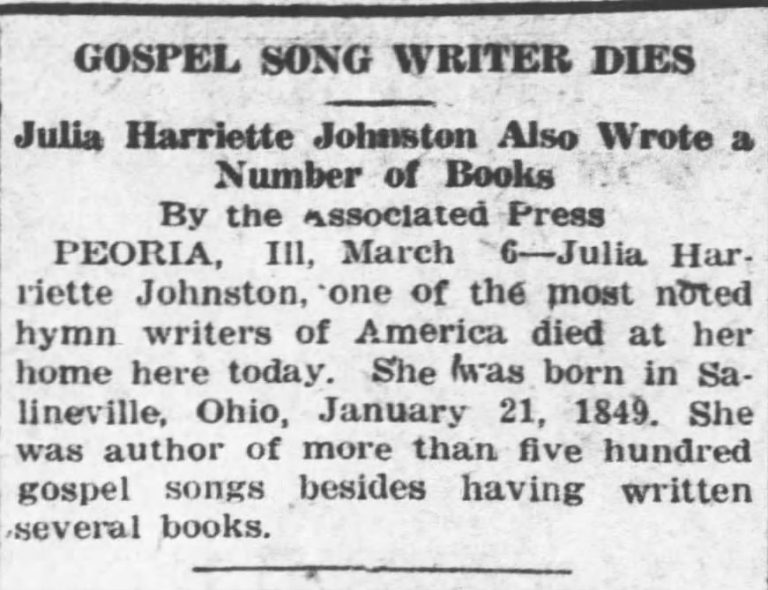Hymn History: Grace Greater Than All Our Sin
Author: Julia Harriette Johnston
I have partly learned some of my lessons,
Some others but dimly I see;
I was ever, I think, a slow learner:
My Teacher is patient with me;
So patient and tender and loving,
So gentle and kindly His rule,
I care not how simple my lessons,
If they are but taught in His school …
(Julia Harriet Johnston, School of the Master, 1880)
Born on January 21, 1849, Julia Harriette Johnston seemed destined to become a prolific writer and faithful servant of the Lord. Her father, Robert, was a Presbyterian minister in Corinth, Ohio (28 miles north of Youngstown), when Julia was born, but a year later he moved the family 275 miles southeast to Gettysburg, Pennsylvania, in order to pastor the only Presbyterian church in town. His pastorate there lasted until Julia was six, at which time Robert assumed the pastorate of First Presbyterian Church in Peoria, Illinois (the site of the 1863 meeting of the General Assembly of Presbyterian Churches). It would be his last because in 1864, Robert went home to be with the Lord when Julia was only 15 years old.
Julia seemed “destined” to become a faithful servant of the Lord. We say “destined” because thirteen of her closest relatives (not counting her father) were connected to the clergy in some way. Her destiny as a writer seemed to be sealed, as well, because her mother composed poetry throughout her life and often immersed Julia in its beauty. Julia began publishing her own creations at the tender age of nine under the pseudonym “Juniata”, but it wasn’t until adulthood that her literary gift began to blossom. By the time of her death, Julia had composed well over 500 hymns and several books (some that contained her own poetry).
Life in Peoria was anything but mundane for the Johnston family.
“From the time of her conversion onward, Julia faithfully laboured for the Master in many pursuits. For more than forty years, she was a Sunday school teacher of infants, was president of the Presbyterian Missionary Society in Peoria, Il, for more than 20 years, wrote several books for Sunday Schools, and penned more than 500 hymns.” (Melody Productions, “Grace Greater than Our Sin – Julia Johnston”, 2022)
The Presbyterian Missionary Society in Peoria that Julia led was actually founded by Julia’s mother.
Julia penned the words to “Grace Greater than All Our Sin” in 1910. Always on the lookout for someone to put her creations to music, Julia found Daniel Brink Towner to compose the tune. D. B. Towner was born in Rome, Pennsylvania, on March 5, 1850, and was musically trained by his father initially. Towner was well respected as a composer, providing the tune to such classic hymns as Anywhere with Jesus, At Calvary, My Anchor Holds, The Old Ship of Zion, Saved by the Blood, and Trust and Obey. He composed the tune for “Grace Greater than All Our Sin” about the same time as Julia wrote the text, but the two were not paired until Towner first published the hymn in Hymns Tried and True in 1911. The tune was given the name “Moody” because of his connection to D. L. Moody’s evangelistic campaigns and the Moody Bible Institute.
“He also had charge of the music for several years at the College Students’ Conference at Mount Hermon and Northfield, Massachusetts. In the fall of 1893, he assumed the superintendency of the music in the Moody Bible Institute, Chicago, whereby his ability as an organizer and teacher he has succeeded in establishing one of the most unique and prosperous training schools for gospel singers in the world. It can be confidently said that most of the noted gospel singers of the present day [written 1915] have either been trained by, or have had personal contact with, Dr. Towner.
In September, 1900, the degree of Music Doctor was conferred upon him by the University of Tennessee.” (Hall, Biography of Gospel Song and Hymn Writers, 1914)
Julia Harriette Johnston died in Peoria, Illinois, on March 6, 1919, and is buried at the Springdale Cemetery in her hometown.
~~~~
Hymn History: Grace Greater Than All Our Sin
Author: Julia Harriette Johnston
“Julia Harriette Johnston served as president of the Presbyterian Missionary Society of Peoria for 20 years, and wrote more than 500 hymns.”
(The Cyber Hymnal)
The Origin of the Hymn “Grace Greater Than All Our Sin”
Among the great hymns of the Christian faith that celebrate the mercy and love of God, few express that message more powerfully than “Grace Greater Than All Our Sin.” Written in 1910 by Julia Harriette Johnston with music by Daniel Brink Towner, this hymn has stood for more than a century as one of the most beloved declarations of God’s forgiving grace. Its rich theology and heartfelt emotion have made it a fixture in worship, reminding believers that no sin is beyond the reach of divine love.
The Hymn Writer: Julia Harriette Johnston
Julia Harriette Johnston (1849–1919) was a dedicated Christian teacher, writer, and Sunday School leader. Born in Salineville, Ohio, she later settled in Peoria, Illinois, where her father, Dr. Eugene R. Johnston, served as a Presbyterian minister. Julia grew up immersed in church life and Christian education. For more than forty years, she served as a Sunday School teacher and superintendent at the First Presbyterian Church of Peoria—a ministry that deeply shaped her understanding of God’s grace and mercy.
Johnston was also a prolific writer. She authored more than 500 hymns, along with several books for young people, including Bright Threads and Jessie Carlton: The Story of a Girl’s Life. Her writing consistently emphasized God’s love, salvation through Christ, and the believer’s call to live joyfully in the light of redemption.
It was from this lifelong devotion to sharing the Gospel that “Grace Greater Than All Our Sin” was born.
The Scriptural Inspiration
The hymn draws its message directly from Romans 5:20, which declares:
“But where sin abounded, grace did much more abound.”
This verse forms the theological backbone of the hymn. Johnston wanted to capture the overwhelming sufficiency of God’s grace—a grace that is not just equal to human sin, but vastly greater. She sought to communicate that no matter how dark or deep one’s transgressions may be, God’s grace shines brighter still.
Other scriptures echo through her words as well: Ephesians 2:8–9, Titus 2:11, and 1 John 1:7. Together, they proclaim that salvation is entirely a work of divine grace, freely given through the blood of Christ.
The Words: A Testimony of Boundless Mercy
Johnston’s text begins with a majestic picture of divine love:
Marvelous grace of our loving Lord,
Grace that exceeds our sin and our guilt!
Yonder on Calvary’s mount outpoured,
There where the blood of the Lamb was spilt.
In these opening lines, she connects human sinfulness with the redemptive act of Christ’s sacrifice. The imagery of Calvary stands at the center—the place where God’s grace and human sin meet, and grace triumphs.
Each verse builds upon the contrast between human helplessness and divine mercy. She speaks of “dark is the stain that we cannot hide,” but answers with “look! there is flowing a crimson tide.” The refrain captures the heart of her message:
Grace, grace, God’s grace,
Grace that will pardon and cleanse within;
Grace, grace, God’s grace,
Grace that is greater than all our sin.
The repetition of the word “grace” is deliberate and emphatic. Johnston wanted her singers not merely to understand grace intellectually but to feel its abundance—to be overwhelmed by it. Her hymn is not an academic statement of doctrine but a song of gratitude and awe.
The Composer: Daniel Brink Towner
To complement Johnston’s lyrics, Daniel Brink Towner (1850–1919) composed a melody of both grandeur and tenderness. Towner was a well-known musician and hymn composer, serving as music director for the Moody Bible Institute in Chicago. He had earlier collaborated with evangelists such as D. L. Moody and Ira Sankey and had composed several enduring hymn tunes, including the melody for “Trust and Obey.”
Towner’s tune for “Grace Greater Than All Our Sin”—known as “Moody”—is noble and expressive. Its broad melodic lines allow singers to lift their voices in full confidence, mirroring the triumph of grace over guilt. The union of Johnston’s text and Towner’s music was first published in 1911 in Hymns Tried and True, a collection issued by Hope Publishing Company.
The Message and Its Enduring Power
What makes this hymn so enduring is its clear and comforting message. It does not minimize sin but magnifies grace. Johnston understood that the Christian life is often haunted by guilt, remorse, and the struggle to believe that forgiveness is truly possible. Her hymn answers those doubts with divine assurance: grace not only forgives but cleanses, not only pardons but restores.
The hymn’s language—simple yet profound—has given comfort to countless believers. It has been sung in revival meetings, church services, and funerals, always pointing hearts back to the cross. Its beauty lies in its ability to speak to every Christian experience, from the new convert amazed by forgiveness to the seasoned believer humbled by ongoing grace.
Legacy
Julia H. Johnston passed away in 1919, only a few years after the hymn’s publication, but her words continue to echo through generations. “Grace Greater Than All Our Sin” remains one of the most frequently sung hymns in Protestant worship, a lasting testament to the wonder of divine mercy.
It stands as a beautiful reminder that no failure, no stain, and no sin can outmatch the grace of God revealed in Jesus Christ. As the refrain triumphantly declares:
Grace, grace, God’s grace—
Grace that will pardon and cleanse within;
Grace, grace, God’s grace—
Grace that is greater than all our sin.
_____
Image Source/Credit (in order):
- Public domain
- https://www.newspapers.com/image-view/700534203/?article=498814aa-86c7-4c42-b5f2-7a60cd1e2c85&terms=Johnston. Accessed 3 Dec. 2025.
- https://www.newspapers.com/image-view/92635339/?match=1&terms=%22GOSPEL%20SONG%20WRITER%20DIES%22. Accessed 3 Dec. 2025.
Related
Sorry, no records were found. Please adjust your search criteria and try again.
Sorry, unable to load the Maps API.


